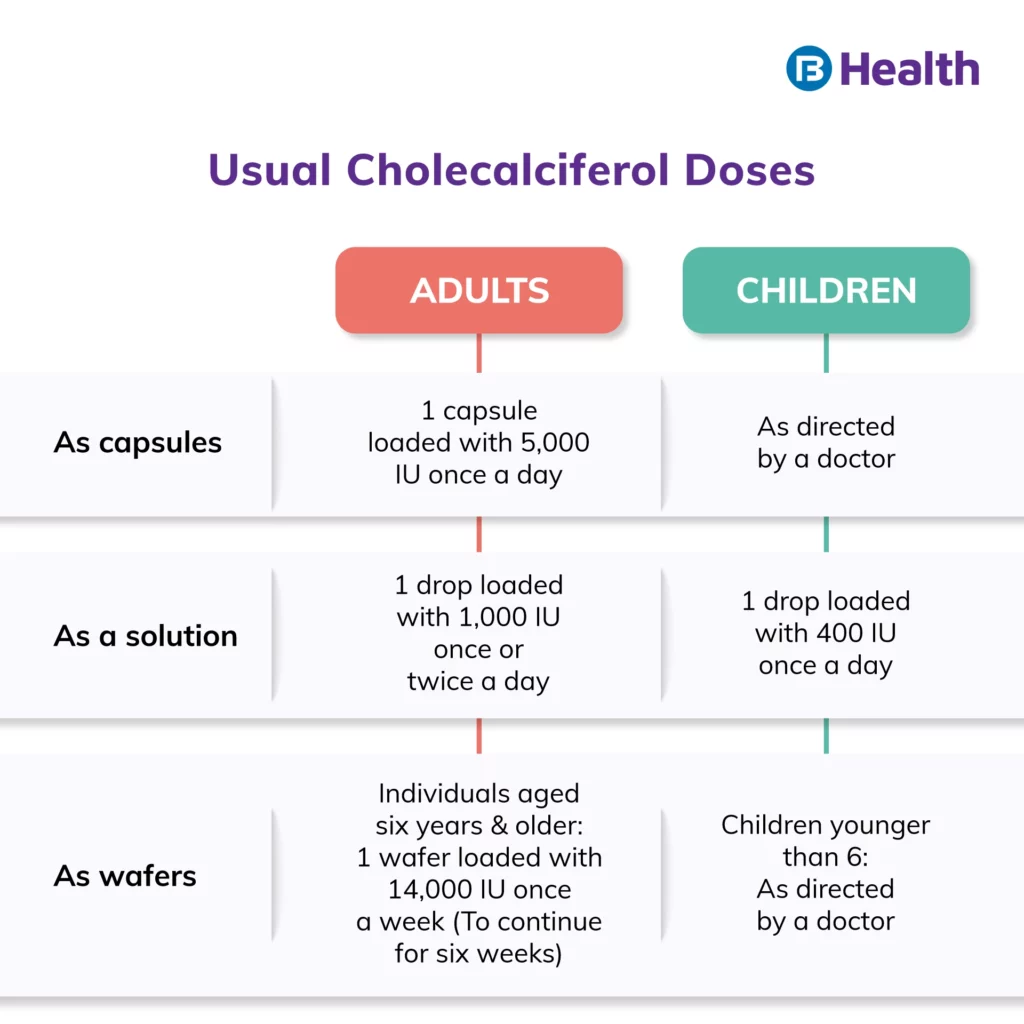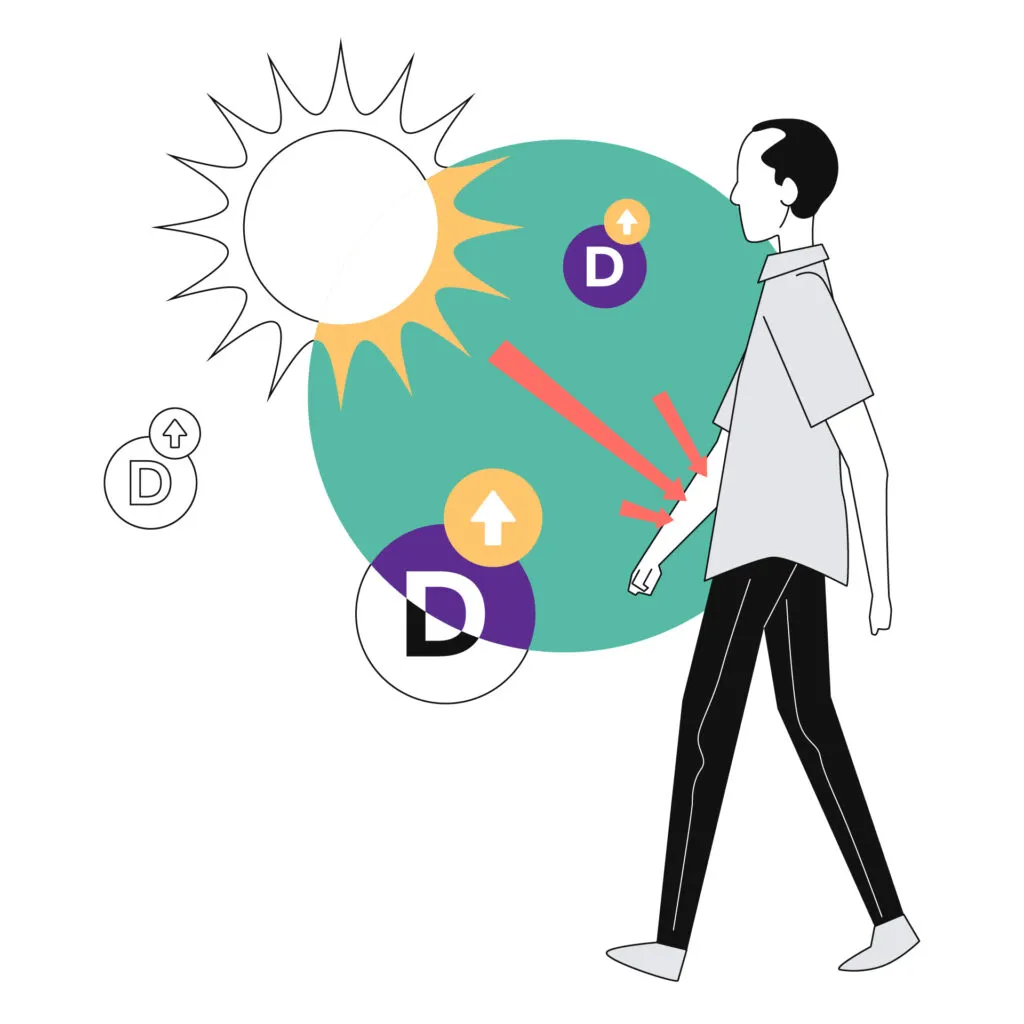General Health | 5 min read
Cholecalciferol: 5 Important Facts to Know About It
Medically reviewed by
Table of Content
Synopsis
If you are looking for information regarding cholecalciferol uses as well as cholecalciferol doses and side effects, you are at the right place. Read on to have a comprehensive understanding of these.
Key Takeaways
- Cholecalciferol, or vitamin D3, is a supplement of vitamin D
- Cholecalciferol can help treat bone disorders such as rickets
- Continuity is the key to getting the best results against cholecalciferol doses
Cholecalciferol, or vitamin D3, is a vitamin D supplement which you can get over the counter or against a doctor's prescription. Doctors usually prescribe cholecalciferol to individuals suffering from vitamin D deficiency [1]. You can buy it as cholecalciferol granules, tablets, capsules, oil, solution, or suspension. To know all about the cholecalciferol uses and doses, as well as the benefits and side effects of cholecalciferol granules, read on.
Cholecalciferol uses
One of the key functions of vitamin D as a fat-soluble vitamin is to help your body get phosphorous and calcium. A proper balance of phosphorous, calcium and vitamin D is crucial for developing and maintaining strong bones. A sufficient amount of cholecalciferol and other vitamin D supplements can prevent bone disorders such as osteomalacia and rickets. It is important to note that the human body prepares vitamin D during its exposure to sunlight. So, factors like age, protective clothing, sunscreen, and minimal sunlight exposure may prevent you from getting sufficient vitamin D from the sun. By prescribing vitamin D with calcium, doctors aim to prevent the decay of bones. The vitamin is also prescribed with other medications for treating low phosphate and calcium levels, often caused by disorders such as hypoparathyroidism and pseudohypoparathyroidism. Cholecalciferol granules uses can also help with kidney diseases by helping maintain a normal calcium level and allowing bones to grow normally. Infants who are breastfeeding also require vitamin D drops or other supplements like cholecalciferol, as breast milk alone cannot fulfil the daily value of the nutrient.
Additional Read: 6 Vitamin D Supplements to Boost Your Immunity
How to take cholecalciferol supplements?
Usually, doctors will ask you to take cholecalciferol or any other vitamin D supplement after meals. But, do note that having a full stomach is not an essential criterion of cholecalciferol doses. Make sure to adhere to the directions on the package of cholecalciferol 60000 IU (international units) and the other supplements prescribed by your doctor. Also, don't exceed the limit of cholecalciferol doses advised by your doctor. Remember, doctors decide the dose based on your medical reports, age, diet, exposure to sunlight, and more. If you are taking the supplement as granules, note that cholecalciferol granules' uses will be fruitful only if you put this medicine on the tongue with a dry hand. Not just that, you need to allow these rapidly-dissolving granules to disintegrate into your saliva without chewing and swallowing them. Similarly, there will be recommended cholecalciferol tablet uses too. If your doctor has prescribed a cholecalciferol wafer or chewable, chew them properly before swallowing, along with any other directions given by the physician.
Note that a few medications, such as orlistat, mineral oil and colestipol, can impact your body's natural absorption of cholecalciferol and other vitamin D supplements. So, take these medications at least 2 hours after your vitamin D doses. Consult with your doctor to check whether you can keep the cholecalciferol doses for bedtime and plan a suitable schedule as per their advice. It will allow you to have a sufficient break before and after taking other medications and ensure complete absorption of vitamin D. Follow the schedule properly throughout the prescribed period for best results. Contact your doctor immediately if you encounter any serious health concerns during the treatment phase.
Usual cholecalciferol doses
Doctors may ask you to have this supplement once a day or once a week. In the first case, make sure to take it at the same time every day. In the second case, consume it on the same day every week. That's how you can ensure the best results after getting treated with cholecalciferol or any other vitamin D supplement.
Common cholecalciferol side effects
Neither cholecalciferol nor any other vitamin D supplement has any potential side effects. As doctors measure your health conditions before prescribing vitamin D, it does no harm in usual cases. However, excessive vitamin D can boost your calcium to harmful levels. Under such a situation, you may come across the following symptoms:
- Constipation
- Fast heartbeat
- Vomiting
- Nausea
- Trouble swallowing
- Reduced or complete loss of appetite
- Frequent urination
- Increased thirst
- Abnormal fatigue
- Mood swings
Get immediate medical help if you come across any of these symptoms. Also, note that cholecalciferol and other vitamin D supplements usually don’t have any allergic reactions. However, if you experience any signs related to severe allergic reactions such as swelling, rashes, breathing difficulty, and dizziness, contact your doctor right away!
Additional Read: International Women's Day: A Guide To Autoimmune Disease!
Precautions you can take to avoid side effects
Though cholecalciferol and other vitamin D supplements have no definite side effects, it’s wise to inform your doctor about your medical history as well as any type of allergies you have. Some medications may contain non-medicine ingredients such as soy and peanut, which some people may be allergic to. Ingredients like aspartame, sugar and alcohol are common in chewable and dissolving tablets, as well as medications in liquid form. All these products can be harmful if you have liver disease, diabetes, phenylketonuria, and a few other conditions. Also, note that the requirement for vitamin D increases during pregnancy. So, discussing all these concerns for a comprehensive treatment plan would be wise.
Conclusion
If you suspect that you have vitamin D deficiency, consult a doctor before taking vitamin D3 tablets or vitamin D supplements like cholecalciferol in any other form. You can book an online or offline doctor consultation on Bajaj Finserv Health for an easy and quick solution. Watch out for any vitamin D deficiency symptoms, and take immediate action to stay at the top of your health!
FAQs
What is cholecalciferol used for?
Cholecalciferol is a vitamin D supplement that doctors prescribe in cases of vitamin D deficiency. If you consume it with calcium, the remedy helps you build and maintain strong bones.
Are vitamin D3 and cholecalciferol the same?
Yes, both are different names for a particular supplement of vitamin D.
References
- https://medlineplus.gov/druginfo/meds/a620058.html
Disclaimer
Please note that this article is solely meant for informational purposes and Bajaj Finserv Health Limited (“BFHL”) does not shoulder any responsibility of the views/advice/information expressed/given by the writer/reviewer/originator. This article should not be considered as a substitute for any medical advice, diagnosis or treatment. Always consult with your trusted physician/qualified healthcare professional to evaluate your medical condition. The above article has been reviewed by a qualified doctor and BFHL is not responsible for any damages for any information or services provided by any third party.





